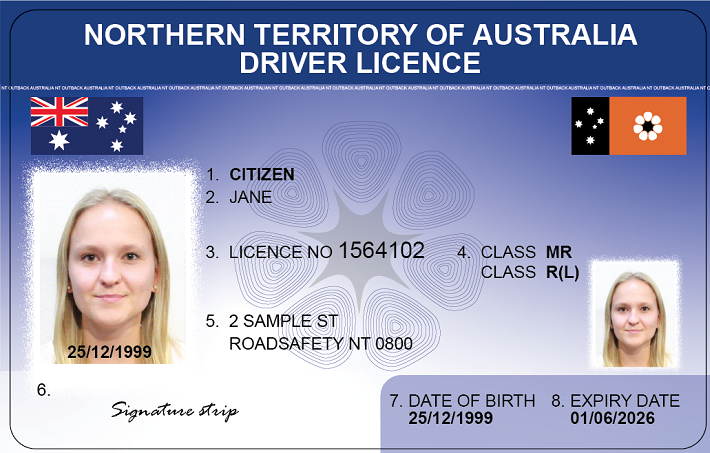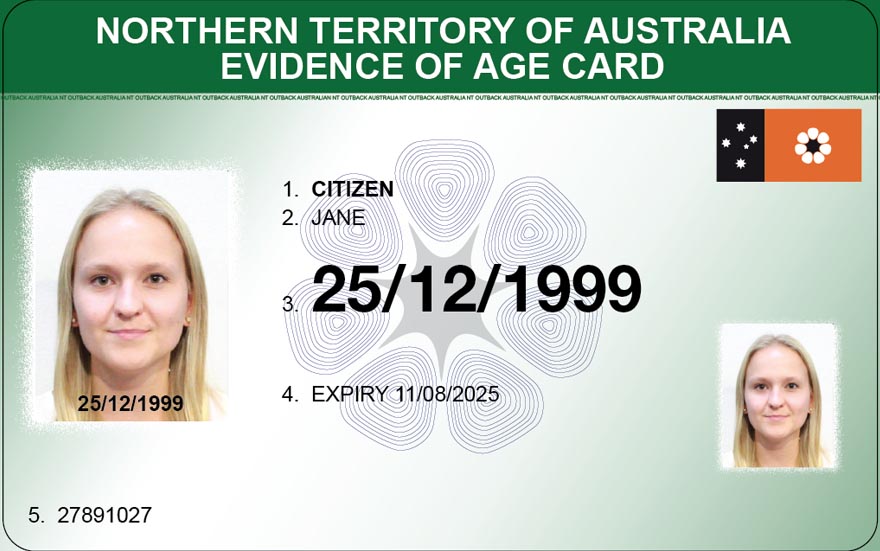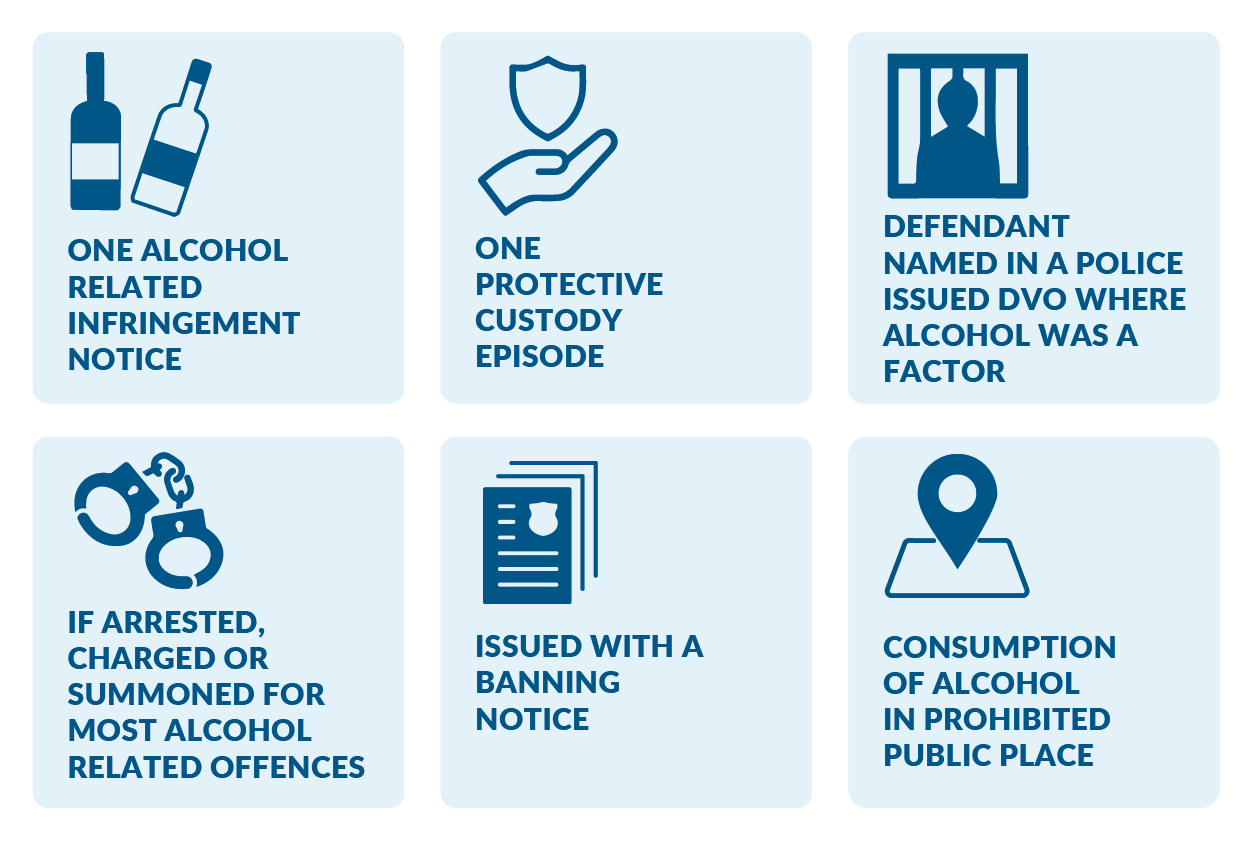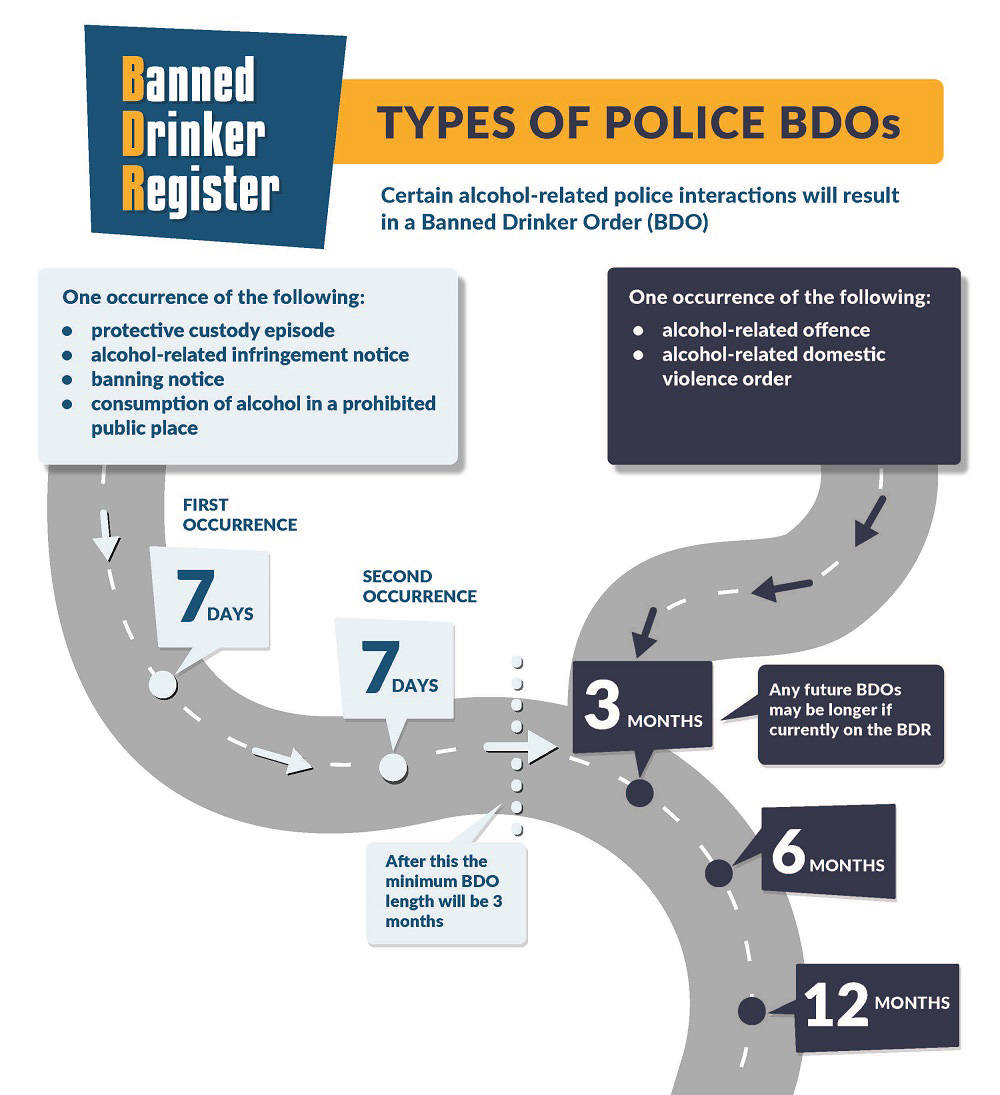Alcohol and the legal age
Updates
From 11 December 2023, there are changes to when police can issue banned drinker orders (BDOs).
In the Northern Territory (NT) you must be 18 years old to:
- buy alcohol
- enter a gaming premises, such as a pokie room or casino
- serve alcohol in a bar, restaurant or liquor outlet.
If you are under 18 years old and caught drinking alcohol in a licensed premise, you will be asked to leave.
You may be charged with an offence if you serve or supply alcohol to someone who is under 18 years old.
Find out more about alcohol and your body.
This website also includes information about where you can find alcohol and drug support or rehabilitation services.
Showing ID when you buy takeaway alcohol
Updates
From 11 December 2023, there are changes to when police can issue banned drinker orders (BDOs).
All Territorians and visitors to the Northern Territory (NT) must show photo ID to buy takeaway alcohol.
Find out more about the changes to who can buy takeaway alcohol.
Approved identification
The photo ID system reads the following types of identification cards:
- Australian or most international driver licences
- Australian or most international passports
- Evidence of age card - also known as 18+ card
- Firearms licence
- NT Ochre Card - also known as a working with children clearance
- Australia Post Keypass Card.
No other forms of ID will be accepted.
Examples of identification
Driver licence

Evidence of age card

Contact
For more information, contact Compliance – Licensing NT by calling 08 8999 1800 or emailing liquorcompliance.ditt@nt.gov.au.
Travellers and tourists to the NT
Updates
From 11 December 2023, there are changes to when police can issue banned drinker orders (BDOs).
If you are travelling to the Northern Territory (NT), you should make sure you know the laws about drinking and buying alcohol.
You can be fined or imprisoned if you break the law.
There are:
- many NT communities where alcohol is totally banned, known as dry areas
- read more about alcohol restrictions in NT communities
- some areas where you must have a liquor permit to drink alcohol
- places in the NT where it is illegal to drink alcohol in public places.
Changes to who can buy takeaway alcohol
From 1 September 2017, all Territorians and visitors to the Northern Territory will need to show photo ID to buy takeaway alcohol.
Find out more about the changes to who can buy takeaway alcohol.
Buying takeaway alcohol
There are rules for buying takeaway alcohol in some areas of the Northern Territory that apply to everyone, including tourists and visitors.
In some areas, you must show photo ID to buy takeaway alcohol.
Find out more about buying takeaway alcohol.
Transporting alcohol through dry areas
You may take unopened alcohol through a restricted area but you cannot drink it, give it away or sell where there is an alcohol ban.
Read more about alcohol restrictions in NT communities.
Penalties
You may be fined, imprisoned or have your vehicle, boat or plane seized if you use them to transport alcohol to a restricted area for distribution without a liquor licence.
Find out more about alcohol penalties and offences.
Drinking in public places
Read about where you can and can't drink alcohol in public in:
Banned Drinker Register (BDR)
Updates
From 11 December 2023, there are changes to when police can issue banned drinker orders (BDOs).
If you're on the Banned Drinker Register (BDR), you are not allowed to buy, keep or drink alcohol in the Northern Territory (NT) for the duration of your ban. This includes takeaway alcohol.
How it works
Anyone who wants to buy takeaway alcohol in the NT must show an approved form of ID.
This is when you buy alcohol from a:
- corner store
- supermarket liquor store
- bottle shop or drive through.
Staff will use your ID to see if you're on the BDR.
In some regions of the NT, there are rules on how much takeaway alcohol you can buy.
If you're on the BDR or you've reached your purchase limit, you won't be allowed to buy alcohol from any store.
How you get on the BDR
If you're on the BDR, it means:
- you have been issued a banned drinker order (BDO) or
- you're on a court or parole order prohibiting you from purchasing, possessing or consuming alcohol.
There are 3 pathways to the BDR:
- the police
- the court and parole
- the BDR registrar by referral from:
Police pathways
The police must issue a BDO for the following:
- 2 low-range drink driving offences or a single mid-range or high-range drink driving offence
- any other alcohol-related offence
- being the named defendant in a police-issued domestic violence order (DVO) where alcohol was a factor
- the issuing of an alcohol-related infringement notice
- being placed into protective custody for alcohol intoxication
- consuming alcohol in a prohibited public place
- being issued with a banning notice.
Court and parole board pathways
Any court or parole order with an alcohol prohibition condition that restricts the purchase, possession or consumption of alcohol.
Examples include conditions of:
- court ordered bail
- a suspended sentence or good behaviour bond
- a parole order.
BDR registrar
The registrar makes a determination after reviewing all evidence as to whether a person should be on the BDR.
Referrals are accepted from authorised persons, including:
- health professionals, registered under the Health Practitioner Regulation National Law (other than a student)
- child protection workers
- social workers
- public housing safety officers
- police
- sobering-up shelter team leaders
- Aboriginal health workers
- Australian Counselling Association level 4 counsellors.
Read more about authorised person referrals.
The registrar can also accept referrals from:
- you, for a self-referral
- family members
- carers
- appointed guardians.
Read more about making a referral for yourself or for someone else.
How long it is for
How long you are on the BDR depends on:
- why you are on the BDR
- whether you have breached a condition of your BDO
- if you choose to complete a therapeutic support program to reduce your BDO.
Police-issued
From 11 December 2023, police must issue BDOs in certain circumstances.
The change includes the introduction of a 7-day BDO. This is when you:
- are taken into alcohol-related protective custody
- get an alcohol-related infringement notice
- get issued with a banning notice
- consume alcohol in a prohibited public place.
Once you have had 2 occurrences of any of the above (can be a combination), future occurrences will result in a 3-month police BDO.
This could be extended further if you're found purchasing, possessing or consuming alcohol while your BDO is in force, possibly leading to an additional 6 or 12 months on the BDR.
The police must issue a 3-month BDO for:
- a qualifying alcohol-related offence, such as medium-range drink driving
- being the named defendant in a police issued domestic violence order where alcohol was a factor
- having already had (since 11 December 2023) 2 separate BDOs for:
- being taken into protective custody
- being issued with an alcohol-related infringement or banning notice
- consuming alcohol in a prohibited public place.
The police can continue to extend your BDO by a period of 3, 6 or 12 months (depending on the current duration of your BDO) if you are found to purchase, possess or consume alcohol.
Court and parole board-issued
A ban resulting from an alcohol prohibition in a court order or a parole order is for the period that is set in your specific order.
BDR registrar-issued
Upon application by an authorised person, self-referral, family, carer or guardian, the registrar can make a determination to approve a BDO for:
- 3 months
- 6 months
- 12 months.
Reducing your ban
If you're on a BDO issued by police or the registrar, you can apply to the BDR registrar to reduce or revoke the remaining period of your ban.
You will need to show proof that you have completed a therapeutic support program.
Find out how to reduce your ban.
Requesting a review
Get more information about your BDO and how to have a decision reviewed.
Reports and evaluations
To find evaluations and monthly statistical information about the BDR, go to the NT Health website.
Contact
You can contact the BDR office between 8am and 4:20pm, Monday to Friday, excluding public holidays:
- call 1800 237 226
- email BannedDrinkerRegister.DOH@nt.gov.au.
BDR scanner technical helpdesk
For licensed premises with or seeking BDR scanners:
- call the 24/7 helpdesk 1800 786 099.
Banned drinker order (BDO)
Updates
From 11 December 2023, there are changes to when police can issue banned drinker orders (BDOs).
If you have a BDO, it means you are not allowed to purchase, possess or consume alcohol for the period of your order.
This includes buying takeaway alcohol.
You will also be on the Banned Drinker Register (BDR).
Who can issue a BDO
You can receive a BDO by:
- alcohol-related interactions with police
- the BDR registrar following a referral by an authorised person
- choice, through a self-referral to the BDR.
You can also be placed on the BDR through an alcohol restriction attached to a court or parole order.
What it means
If you purchase, possess or consume alcohol, you will be in breach of your BDO and your order may be extended.
If you breach a condition of a court or parole order the matter may be brought back before the relevant authority.
Secondary supply
If someone knows you're not allowed to have alcohol and gives it to you anyway, that person may also be charged with an offence.
From 11 December 2023, penalty for secondary supply is 100 penalty units ($17,600).
Get support and reduce your BDO
Get support and learn more about how to reduce your BDO.
Review of police-issued BDO
If you have a police issued BDO, contact the police if you:
- would like more information about your BDO or to get a copy
- do not believe you should have been given a BDO
- believe an administrative error has been made
- would like police to review the circumstances surrounding the making of your BDO.
Contact police about your BDO:
- call 08 8999 8600
- email Police.BDO.Enquiries@pfes.nt.gov.au.
Review of BDR registrar-issued BDO
You can get further information from the BDR office if you:
- are unsure why you were issued a BDO
- believe you were incorrectly placed on the BDR
- have been placed on income management by the BDR registrar.
You can also give permission for a representative to make enquiries on your behalf.
Contact the BDR office between 8am and 4:20pm, Monday to Friday, excluding public holidays.
- call 1800 237 226
- email BannedDrinkerRegister.DOH@nt.gov.au.
Court imposed alcohol restrictions
If you have an alcohol restriction that is part of a court or parole order, it is a matter for that authority.
Contact the Northern Territory Local Courts or community corrections.
Challenging a BDO further
If you are not satisfied with the outcome of your internal review by police or the BDR registrar, you can contact the Northern Territory Civil and Administrative Tribunal (NTCAT).
Get the information sheet on NTCAT decision reviews PDF (349.0 KB).
NTCAT can investigate the ban and they may decide to:
- uphold the decision
- reduce your ban
- remove it.
If you have an alcohol restriction attached to a court or parole order, it is a matter for that authority and NTCAT can't assist.
To contact NTCAT, go to the NTCAT website.


